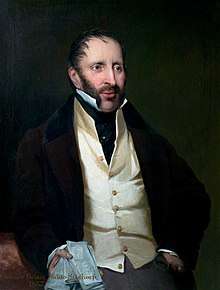Charles Sibthorp
Charles de Laet Waldo Sibthorp (14 February 1783 – 14 December 1855), popularly known as Colonel Sibthorp, was a widely caricatured British Ultra-Tory politician in the early 19th century. He sat as a Member of Parliament for Lincoln from 1826 to 1832 and from 1835 until 1855.
Charles Sibthorp | |
|---|---|
 Portrait of Sibthorp by John Andrews. | |
| Member of Parliament for Lincoln | |
| In office 1835–1856 | |
| Member of Parliament for Lincoln | |
| In office 1826–1832 | |
| Personal details | |
| Born | 14 February 1783 Lincoln, Great Britain |
| Died | 14 December 1855 (aged 73) London, United Kingdom |
| Political party | Tory/Ultra-Tory |
| Military service | |
| Allegiance | |
| Branch/service | |
| Years of service | 1803–1822 |
| Rank | Lieutenant-Colonel |
| Unit | 4th Dragoon Guards Scots Greys |
Sibthorp was born into a Lincoln gentry family, the son of Colonel Humphrey Waldo Sibthorp, of Canwick Hall, by his wife Susannah, daughter of Richard Ellison, of Sudbrooke Holme, Lincolnshire. His brother, Richard (1792-1879), was an Anglican clergyman (later admitted into the Roman Catholic faith).[1][2] He was commissioned into the Scots Greys in 1803, promoted Lieutenant in 1806, and later transferred to the 4th Dragoon Guards, in which he reached the rank of Captain. He did not serve abroad and continued in the service until 1822, when he succeeded to the family estates and also succeeded his brother as Lieutenant-Colonel of the Royal South Lincolnshire Militia. In 1812, he married Maria, daughter and co-heiress of Ponsonby Tottenham, M.P. for Fethard, County Tipperary; they had four children.[3]
Member of Parliament
During Sibthorp's three decades in Parliament, he became renowned, along with Sir Robert Inglis, as one of its most reactionary members. He stoutly opposed Catholic Emancipation,[4] Emancipation of the Jews in England, the Reform Act of 1832, the repeal of the Corn Laws, the 1851 Great Exhibition[5] and the construction of the National Gallery.[6] He was convinced that any changes from the Britain of his youth (in the late 18th century) were signs of degeneracy, that Britain was about to go bankrupt, and that the new railways were a passing fad which would soon give way to a return to "chaises, carriages and stages".[7]
He was opposed to all foreign influences, and offended Queen Victoria with his public suspicions of Prince Albert, the prince consort. His political views, his bluntness in expressing them, and his eccentricities made him the target of both witticisms and cartoons in Punch.
He was returned to Parliament on eight occasions.
Sibthorp died at his home in London, and was succeeded as MP by his son, Gervaise Waldo-Sibthorp.
References
- https://en.wikisource.org/wiki/Sibthorp,_Richard_Waldo_(DNB00)
- https://en.wikisource.org/wiki/Sibthorp,_Charles_De_Laet_Waldo_(DNB00)
- https://en.wikisource.org/wiki/Sibthorp,_Charles_De_Laet_Waldo_(DNB00)
- John F. Michell (April 1999). Eccentric Lives and Peculiar Notions. Adventures Unlimited Press. pp. 58–. ISBN 978-0-932813-67-1.
- John F. Michell (April 1999). Eccentric Lives and Peculiar Notions. Adventures Unlimited Press. p. 59. ISBN 978-0-932813-67-1.
- John F. Michell (April 1999). Eccentric Lives and Peculiar Notions. Adventures Unlimited Press. p. 60. ISBN 978-0-932813-67-1.
- John F. Michell (April 1999). Eccentric Lives and Peculiar Notions. Adventures Unlimited Press. p. 61. ISBN 978-0-932813-67-1.
- S Roberts & M Acton "The Parliamentary Career of Charles De Laet Waldo Sibthorp 1826 - 55: Ultra Tory Opposition to reform in Nineteenth Century Britain" New York 2010.
- Dodds, John W. The Age of Paradox : A Biography of England, 1841-1851. Westport, Conn. : Greenwood, 1970 [1952].
- Michell, John. Eccentric Lives and Peculiar Notions, 1984 ISBN 0-7474-0353-8.
- Attribution
![]()
External links
- Hansard 1803–2005: contributions in Parliament by Colonel Charles Sibthorp
| Parliament of the United Kingdom | ||
|---|---|---|
| Preceded by John Williams Robert Percy Smith |
Member of Parliament for Lincoln 1826 – 1832 With: John Fazakerley to 1830 John Fardell 1830–31 George Heneage from 1831 |
Succeeded by Edward Lytton Bulwer George Heneage |
| Preceded by George Heneage Edward Lytton Bulwer |
Member of Parliament for Lincoln 1835 – 1856 With: Edward Lytton Bulwer to 1841 William Collett 1841–47 Charles Seely 1847–48 Thomas Hobhouse 1848–52 George Heneage from 1852 |
Succeeded by Gervaise Sibthorp George Heneage |